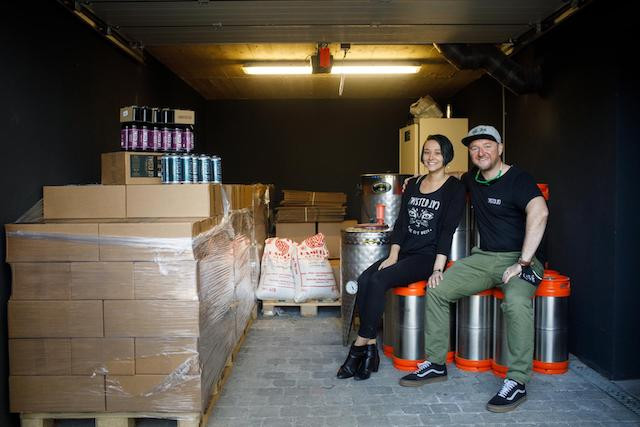Alison Adams and her husband, Tom Hickey, started brewing for fun around five years ago. “We learned a lot in the first year,” Adams says. “The process is not super complicated, but a lot can go wrong.”
While Adams has past experience working in bars in Paris and “drinking a lot of craft beers”--also back in her native USA--Hickey is known on the market in his role as senior partner (alongside brother Ray and associate Gabriel Boisante) in popular gastro-bars like Urban, Bazaar and Paname.
After purchasing special brewing equipment to set up in their own basement, the duo set out to perfect a unique beer which could “create a bridge”, as Adams puts it, between industrial beer and the craft beer market, which she says can be “intimidating”.
They began sharing it with friends, getting their feedback, and realised they might be onto something. The result was their original pale ale, now sold in kegs, boxes and cans.
Of course, as home brewers, they soon reached a limit in what they were able to produce, and so by 2019 they got help producing larger quantities via Bare Brewing. At that time, Twisted Cat was being produced mainly in kegs, but occasionally 25cl cans were made for events and marketing efforts. In early 2020, they also started working with Benny Waller of Den Heischter out of Heiderscheid and by end-2020 with Clausel, although they’re still collaborating with the other two brewers, changing solely for strategic or capacity reasons.
Reorientation toward canning
By the time the health crisis reached Luxembourg, Adams says there were at least 2,000 litres of beer waiting to be kegged. “We had to think fast. Our original business plan did not include canning or bottling right away,” Adams explains.
In May of last year, they formally created their company and decided to reorient themselves, pushing more into retail and producing 44cl cans.
“Cans are better than bottles in almost every respect when it comes to beer. [They] are more recyclable than bottles, stock easier in the fridge and don’t break [like glass could],” Adams explains, adding that canning also has a benefit for the quality since “there’s no way light can enter, and they get colder faster.”
Looking back, Adams says the challenges for Twisted Cat in light of the health crisis actually turned out to be “a good thing, because it pushed us into canning.” Nevertheless, she thinks there’s still work to be done on the local market to change perceptions around cans, and it’s partly for this reason Twisted Cat also decided to create a glass similar to a wine glass, to enhance the drinking experience.
Over the warmer summer months last year, Adams says there was a health uptick in their sales. This January, the team also cleverly took advantage of the dry January trend to launch its first alcohol-free IPA.
Twisted Cat has the Made in Luxembourg label--all the labour, production and packaging are done locally (even if certain malts, for example, have to be imported from Germany).
Although Adams says she hopes to see the brand expand--perhaps even one day sold back in her home country of the US--for now Twisted Cat is available for purchase at 130 sales points in Luxembourg, including in all of the major supermarkets, with more being regularly added.
